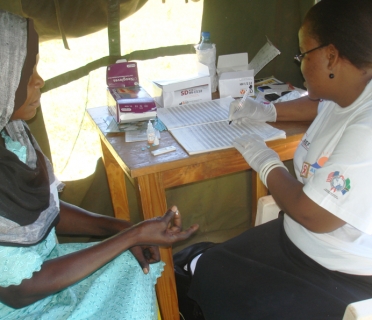 This World AIDS Day there is much discussion about the possibility of ending AIDS by 2030. UNAIDS has launched a set of fast track targets that it thinks will help to achieve the goal of a world in which HIV is no longer a global health threat and is calling on the world to “close the gap” – empowering and enabling all people, everywhere, to access the services they need.
This World AIDS Day there is much discussion about the possibility of ending AIDS by 2030. UNAIDS has launched a set of fast track targets that it thinks will help to achieve the goal of a world in which HIV is no longer a global health threat and is calling on the world to “close the gap” – empowering and enabling all people, everywhere, to access the services they need.
In its 2014 Gap Report, UNAIDS listed the population groups falling through the gaps and being left behind. For the first time this list included older people aged 50 and over.
But what do the new targets mean for people living with and at risk of HIV in older age, and how will they be met?
HIV data and older people
By 2020: 90% of all people living with HIV will know their HIV status.
Evidence shows that older people have lower levels of HIV-related knowledge than younger groups and are less likely to have tested for HIV. In Rwanda 19% of people aged 50 and over report having ever tested in comparison with 44% of people 25-49[1].
If the fast track target of 90% of all people living with HIV knowing their status is to be met, considerable focus will be needed on raising awareness among older people and ensuring testing is delivered in a way that is appropriate to them. Our programming experience shows this is more than possible. With our partners we achieved an increase in testing rates among older people from 30% in 2008 to 80% in 2013.
By 2020: 90% of all people with diagnosed HIV infection will receive sustained antiretroviral therapy (ART).
Little data on access to ART is disaggregated by age meaning we don’t have a clear picture of whether older people are able to access treatment. The findings of a study conducted in Ethiopia, South Africa, Tanzania and Uganda by HelpAge suggest older people do not have equitable access and are more likely to access treatment later.
If 90% of people diagnosed with HIV are to receive ART much greater emphasis will be needed on ensuring access is not only scaled up, but also equitably distributed, with no population group left behind.
90% of all people receiving ART will have viral suppression.
In order to achieve viral suppression people must be supported to adhere to treatment. HelpAge’s study findings suggest when older people access ART they adhere well and are less likely to be lost to follow up than younger people. However, older people have more complex health needs, often experiencing a number of conditions at the same time.
If 90% of people receiving ART are to reach viral suppression the health challenges of people living with HIV in older age, and the potential interactions of drugs for different conditions, will need to be better understood and addressed.
World AIDS Day events
How HelpAge is marking World AIDS Day to ensure older people don’t continue to fall through the gaps.
In Kenya: HelpAge and our partners will be attending the launch of the Kenya AIDS Strategic Framework. Following our influencing work the framework recognises the impact of HIV on older people. An older person living with HIV has been invited to speak at the event and will be demanding the full implementation of the provisions for older people included in the framework.
In Uganda: HelpAge affiliate URAA will join the national celebration, presided over by the President. Older people will hold a march at the event to call for their inclusion in all HIV policies, plans and programmes.
In Tanzania: We will attend the national celebrations in Njombe region. A documentary developed by HelpAge’s partners in the region will be shown to generate public discussion on the need to address ageing related concerns in the HIV response.
In Mozambique: HelpAge’s partner ACIDECO is supporting the organisation of a health fair in the Manhiça district, that will provide counselling and testing and HIV education. Older people will be supported to attend through the provision of free transport to the fair from their villages.
In Ethiopia: Together with our affiliate EEPNA and partners the Addis Ababa Older People’s Association and Tesfa Social and Development Association, we will hold a breakfast meeting with the media to raise awareness of the impact of HIV on older people.
In South Africa: Our Affiliate MUSA will hold an event focused on older people’s access to treatment. Alongside presentations, older people affected by HIV will hold a candle lighting ceremony and sing a song on HIV they have composed for the event.
Find out more about our work on HIV and AIDS.
References
[1] Negin J et al 2011 HIV Attitudes, Awareness and Testing Among Older Adults in Africa AIDS Behav. DOI 10.1007/s10461-011-9994-y
